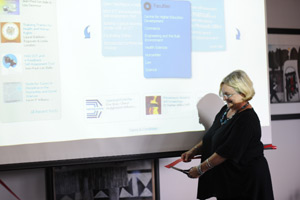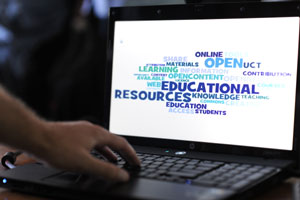OpenContent Directory frees UCT knowledge resources
16 February 2010 | Story by Newsroom Opening cut: Deputy vice-chancellor Professor Jo Beall officially opens the new OpenContent Directory.
Opening cut: Deputy vice-chancellor Professor Jo Beall officially opens the new OpenContent Directory.
UCT's OpenContent Directory, which allows easy, free online access to a selection of UCT teaching and learning resources, was officially launched on 12 February.
This is a first step towards developing OpenUCT, a far-reaching initiative to make a range of UCT's knowledge resources, including research, available to anyone with internet access.
UCT has joined the international OpenCourseWare Consortium, a collaboration of more than 200 organisations around the world using a shared model to create a body of open educational content. Their mission is to advance education and empower people worldwide by making knowledge and information more freely available online.
Funded by the Shuttleworth Foundation and developed as part of the Open Educational Resources Project in the Centre for Educational Technology (CET), the directory showcases UCT's collection of open educational resources. The subsequent development of the broader OpenUCT initiative will increase the institution's participation in the global open research, teaching and social responsiveness environment.
"Launching the OpenContent Directory is a significant step towards making UCT's African knowledge more accessible to the world," says vice-chancellor Dr Max Price. "The open movement is already giving Africans easier access to knowledge from the world's top universities. UCT's OpenContent directory will enhance this endeavour by contributing South African resources to the global Knowledge Commons.
"I congratulate all involved in implementing this. As the OpenContent directory comes on stream, our continent's valued participation in global affairs will accelerate and our continent and the world will be the better for it."

"Through this initiative, the university will provide a global platform for the rich body of research and knowledge that is coming out of Africa," says deputy vice-chancellor Professor Jo Beall. "Open content initiatives also enable universities across Africa to establish an online connection to a wealth of resources from other continents: teaching materials, research findings, articles and statistics. These materials from prestigious universities like MIT were previously out of reach because they were only available to those who could afford to pay for published materials. Today you don't even have to be part of a university to access open content - anybody can log in."
CET's Associate Professor Cheryl Hodgkinson-Williams said that making such materials available outside academic circles will help create a culture of lifelong learning in South Africa.
"Institutions like UCT are paid for by taxpayers, but until now, most South Africans have not had the benefit of the knowledge that is produced at universities," she said. "Through the OpenContent Directory and OpenUCT, learning and knowledge sharing will become something anyone can participate in. Researchers and educators will be able to share their findings, build on each other's work and create a wider, more comprehensive body of world knowledge. And people outside of the academic campus will be able to look up information just as freely."
The launch of the OpenContent directory is one way of putting into effect Price's vision of UCT as an Afropolitan university, by making African content available globally.
Historically, academic knowledge has been available only through published materials. As a result, academics in Africa have been largely dependent on books from the US or Europe, where publishers could print for a bigger market at a lower cost.
"But African researchers and teachers have important perspectives on subjects as diverse as economics and art, health and climate change,' says Beall. "UCT's OpenContent Directory is a starting point for putting Africa's contributions into the global body of knowledge."
View the OpenContent Directory.
 This work is licensed under a Creative Commons Attribution-NoDerivatives 4.0 International License.
This work is licensed under a Creative Commons Attribution-NoDerivatives 4.0 International License.
Please view the republishing articles page for more information.










